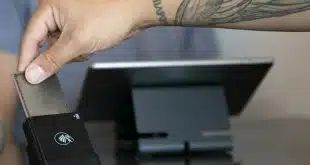(An Open Letter to the Electronic Payments Industry)
n
On October 16, 2013, I delivered a keynote address to the Strategic Leadership Forum of the Electronic Transactions Association (ETA) on my views of the evolution of the payments industry. At the beginning of this address, I told the audience that some of my comments would be controversial and I kept my promise, knowing that some members of the audience would be supportive and that others might be offended. Frankly, I didn’t care if I offended some of the attendees because we need a discussion of what is unethical vs. what is criminal in our industry. The goal of my address was not to tell others how to run their business, but rather to shed light on the criminal practices currently taking place in our industry that are duplicitous and designed to prey upon merchant customers, and which I feel must change.
Within hours of my address, one of our industry publications published an article, titled “Heartland’s Carr Calls for More Regulation.” The article claims that I called for more regulation of ISOs and, in the process, offended their readers. Really? I did not specifically attack ISOs at all. In fact, all non-banks, by definition, are ISOs, including Heartland Payment Systems. I called out criminal and misleading practices in our industry, specifically 1) falsifying interchange, 2) deliberately misrepresenting MCC codes and 3) using extortion and intimidation tactics to enhance merchant retention, which extend beyond the ISO community, and called on the industry to change these practices.
If these practices don’t change, I believe the government will be forced to step in and take action. This article indicates that I called for the Federal Trade Commission (FTC) to “police” our industry, leading to the inescapable conclusion that our industry is incapable of telling the truth to merchants, incapable of providing understandable merchant statements and contracts, and incapable of abandoning “bait and switch” tactics. But I don’t think so.
I think that government regulation may be unnecessary if we can clean up our industry on our own. But this article is a good example of what happens in our industry all too often. Some of those benefiting from bad behaviors look the other way and attack the messenger in the ultimate act of intellectual dishonesty.
My purpose in writing this letter is to ask for your help once and for all in lifting the veil of dishonest practices that have tarnished our great industry for decades. The Bankcard Services Association (later to become the ETA) was formed in the late 1980s for the primary purpose of ridding the industry of the unethical practices called out by industry journalists John Stewart and Linda Punch In Credit Card Management magazine. I served as a source for one of those articles and am proud that I did.
In an early effort to clean up the industry, Jay Hearst, a man of great integrity and honor, sent a letter to his industry peers and invited them to attend a meeting in Chicago at the O’Hare Hilton. About 15 of us showed up for that meeting, including representatives from Peachtree, a processor run by a known convicted felon. Recognizing that we were gathered to combat unethical practices, I asked the group if we would be comfortable allowing convicted felons into the organization, and the Peachtree people did not return after the lunch break and did not become members of the BSA.
Later, in 1990 in Denver, Jay and I presented the report of the BSA’s Ethics Committee of which we were both members. I made a formal motion that convicted felons not be allowed to be members of the BSA. In my early days as an officer of the Bank of Illinois, I learned that a convicted felon could not be a bank officer in Illinois and, to me, it was logical that our industry should be held to the same standards as bank officers. The motion was defeated and I immediately resigned publicly as the founding vice president of the organization.
The ETA has certainly become a strong industry organization and today I am proud to be a member and to have Heartland’s Vice-Chairman serve on its Board of Directors.
However, to date, no one in our industry has championed the eradication of the bad practices that have gone on for decades. But, after my talk, many, many industry leaders expressed their support and acknowledged that “It is about time someone said this publicly,” urging me not to give up the good fight.
I will not waiver in my commitment to putting a stop to the criminal behaviors that have become all too common in our industry. I call for collaboration with the FTC to stop these criminal practices. In addition, I call for the networks to do a much better job of enforcing all of their rules. If we are going to have rules that are not enforced, let’s remove the resulting double standard that is created by allowing the rule breakers to have a competitive advantage over those who follow the rules.
There is absolutely no reason for our industry to be tarnished as it is today. We should be trusted partners who can help merchants succeed — not hinder them. It is long past time to do this and I call upon an honorable leader in our industry, Jason Oxman, the CEO of the ETA, to lead this mission. He is a capable leader, but he’ll need all of our support.
Bob Carr is chief executive officer of Heartland Payment Systems Inc., Princeton, N.J.





